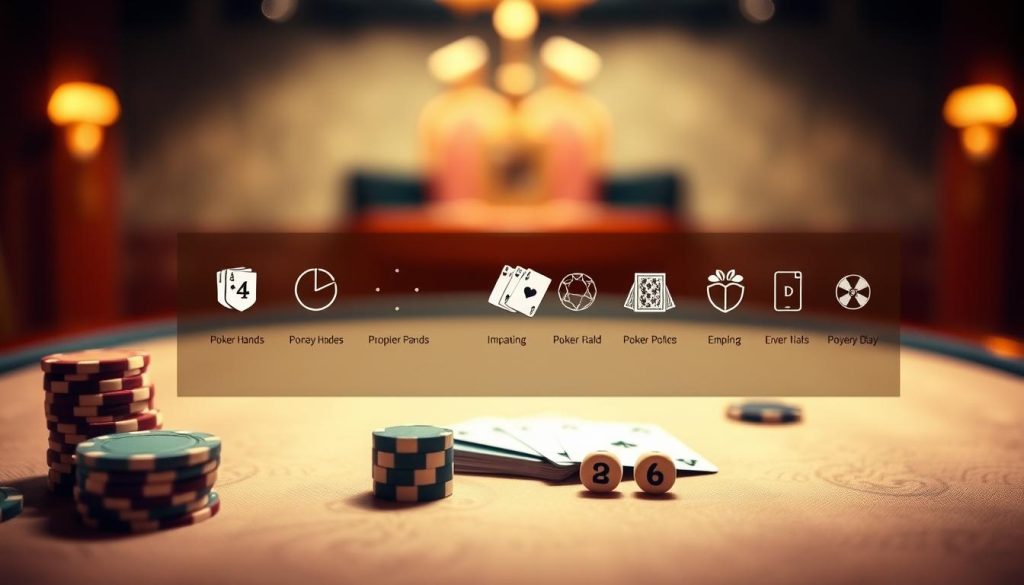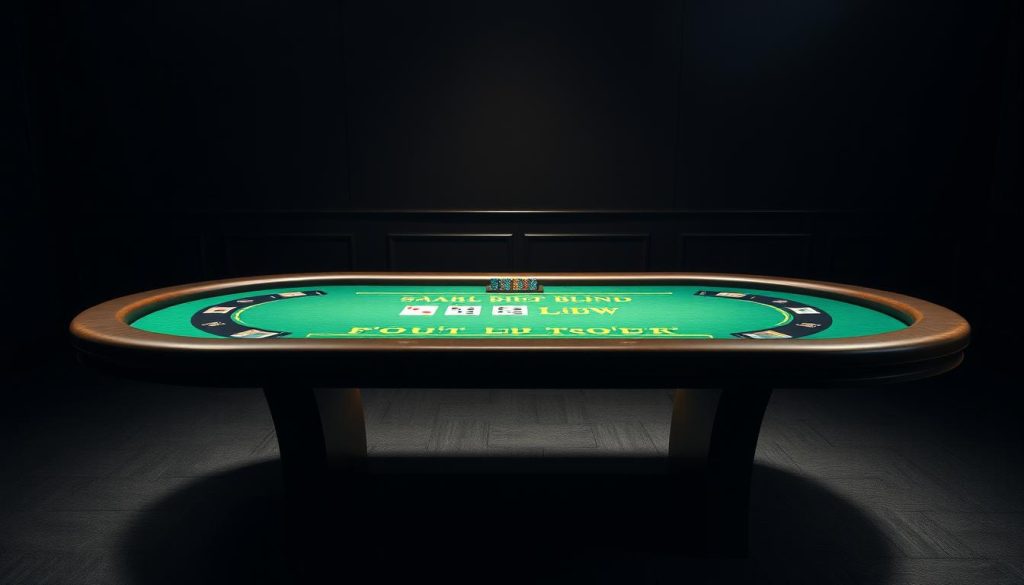Welcome to the ultimate beginner’s guide to poker rules! Are you ready to play with friends or dream of poker tournaments? Understanding the basics is key to success. Poker is more than luck—it’s a mix of strategy, psychology, and smart risks.
This guide will simplify complex rules for beginners. We’ll cover hand rankings and gameplay strategies. Poker might seem tough at first, but with knowledge, you’ll feel more confident.
Learning poker rules is easy. We aim to turn you from a novice to a skilled player. By the end, you’ll know the basics and start winning.
Ready to explore poker? This guide covers Texas Hold’em, Omaha, and more. It’s your first step to playing with confidence.
Getting Started with Poker: Basic Concepts
Poker is a thrilling card game that mixes skill, strategy, and luck. For new players, learning the basics is key to having fun and doing well.
The main goal of poker is simple. It’s to win chips or money by having the best hand or making others fold. This goal adds excitement and strategy to the game.
Popular Types of Poker Games
Poker has many fun variations that keep players interested. Here are some well-liked types:
- Texas Hold’em: The most played poker type
- Omaha: Like Hold’em but with four hole cards
- Seven-Card Stud: A classic game without community cards
- Five-Card Draw: A traditional game great for beginners
The Standard Card Deck
Knowing the card deck is vital for poker basics. Most games use a 52-card deck. It has four suits:
- Hearts (red)
- Diamonds (red)
- Clubs (black)
- Spades (black)
Each suit has 13 cards: Ace, 2-10, Jack, Queen, and King. Learning the deck is your first step to becoming a good poker player.
Essential Poker Rules for Beginners

Learning poker game rules can seem tough at first. But, with the right help, anyone can learn how to play poker. The game starts with players getting a set number of cards. This depends on the poker variant being played.
When you start learning poker, knowing the basic actions is key. Players have a few options during their turn:
- Check (pass the action without betting)
- Bet (place chips into the pot)
- Raise (increase the current bet)
- Fold (quit the current hand)
The rules of poker are about making the best hand or making others fold. Each round of betting lets players improve their hand or cut losses.
Player positions are very important in poker strategy. The dealer button moves clockwise after each hand. This changes the betting order and who has the upper hand. Positions include:
- Early position (first to act)
- Middle position
- Late position (last to act)
Learning these basic rules will help beginners feel more confident. Practice and watching others play are key to getting better at poker.
Understanding Poker Hand Rankings
Learning poker hand rankings is key for success at the poker table. Knowing the best hands can change the game. These rankings show which card combinations are most valuable.
Hand rankings start with the strongest hand and go down to the weakest. It’s important for players to know these rankings to make good choices.
The Hierarchy of Poker Hands
- Royal Flush: The top hand, with A-K-Q-J-10 of the same suit
- Straight Flush: Five cards in a row of the same suit
- Four of a Kind: Four cards of the same value
- Full House: Three of a kind and a pair
- Flush: Five cards of the same suit
- Straight: Five cards in a row but different suits
- Three of a Kind: Three cards of the same value
- Two Pair: Two different pairs
- One Pair: Two cards of the same value
- High Card: The highest single card when no other combination exists
Memorizing Hand Strengths
Learning hand rankings takes time. Beginners can use charts or tricks to remember them. It’s important to know that each hand is more complex and valuable than the last.
Common Hand Combinations
Some poker hands are rare, but others are common. A pair is the most common hand. Knowing these common hands can help you make better choices at the table.
The Structure of a Poker Game

Knowing how a poker game works is key for any player. Texas Hold’em, the top poker game, has a clear sequence of rounds. This makes the game exciting and full of strategy.
The game goes through several important stages:
- Pre-Flop: The first betting round
- Flop: The first three community cards are shown
- Turn: The fourth community card is shown
- River: The final community card is shown
At each stage, players make big decisions about their hand. The game starts with two players posting bets called blinds. This adds money to the pot and gets the game going.
Players get two private cards that only they see. As community cards are shown, players figure out their hand’s strength. They then decide to call, raise, or fold. The game’s structure offers many chances to bet, making each round tense and strategic.
The dealer button moves clockwise after each hand. This makes sure everyone gets a fair turn and a chance to be in different spots.
Betting Fundamentals in Poker
Poker betting rules are key to the game. They make it more than just cards. They turn it into a battle of wits.
At the heart of poker is strategic betting. Players need to understand the basics of poker’s money game.
Small and Big Blinds: The Game’s Starting Point
Blinds in poker start the game. They make sure there’s money in the pot. They also encourage players to play:
- Small blind: Half the minimum bet
- Big blind: The full minimum bet
- Players change blind spots each hand
Betting Rounds Explained
Poker has many betting chances in a hand:
- Pre-flop: Betting after getting hole cards
- Flop: Betting after three community cards
- Turn: Betting after the fourth card
- River: Final betting round before showdown
Understanding Pot Odds
Pot odds show the pot size vs. the call cost. Smart players use this to decide to call or fold.
Learning poker betting rules takes time. Every bet is a strategic move. It shows what you have and what your opponents might have.
Player Positions and Their Importance

Knowing about poker positions is key to winning. The order of play changes based on your position at the table. The table is split into early, middle, and late positions.
Your seat at the table matters a lot. Players in late positions have an edge. They see what others do before acting. This lets them make smarter moves and bluff better.
- Early Position (first to act): Limited information about other players’ hands
- Middle Position: Moderate information and strategic flexibility
- Late Position (closest to dealer button): Maximum strategic advantage
Where you sit at the table changes how you play. A strong hand in late position might be risky early on. Pros adjust their play based on their position.
For beginners, learning about positions is crucial. It affects betting and hand outcomes. Practice and watching others will improve your understanding of positions.
Common Poker Terms and Expressions
Starting in poker feels like learning a new language. Knowing poker terms and lingo is key for new players. This guide will help you understand the unique words used in games.
Getting poker vocabulary is more than just words. It’s about grasping the detailed talks during a game. Players use special terms for actions, hands, and strategies. These might sound strange to beginners.
Basic Poker Vocabulary
- Ante: A small bet all players must make before the hand starts
- Call: Matching the current bet to stay in the hand
- Raise: Increasing the current bet amount
- Fold: Giving up your hand and losing any bets already placed
Action Words at the Table
Poker lingo includes action words that show player interactions. Learning these terms helps you follow the game’s flow. It also lets you talk well with other players.
- Check: Passing the action without betting
- All-in: Betting all remaining chips
- Re-raise: Increasing a bet that has already been raised
Reading the Board
Reading the board means understanding community cards and hand combos. This skill is key for making smart game decisions. Knowing these cards can boost your poker skills.
- Flop: First three community cards
- Turn: Fourth community card
- River: Final community card
By learning these poker terms and expressions, you’ll feel more at ease at the table.
Basic Poker Strategy Tips
Learning a good poker strategy is key for beginners. It’s not just about knowing the rules. It’s about making smart choices to win more.
Here are some important tips for new players:
- Start with strong starting hands
- Play fewer hands but play them aggressively
- Pay attention to your position at the table
- Learn to read your opponents’ betting patterns
- Manage your bankroll carefully
Position is very important in poker. Players closer to the dealer have more info. They can make better choices.
Keeping your emotions in check is crucial. Don’t play when you’re upset or tired. Good players stay calm and think carefully about each hand.
Bluffing is an art, not a regular strategy. Beginners should learn about hand strengths and make smart bets. Practice, patience, and learning are essential to get better.
Common Mistakes New Players Make
Poker can be tricky for newcomers. It’s key to know common mistakes to get better. Many new players fall into traps that pros quickly spot.
Knowing how to avoid poker mistakes can really boost your game. Some big errors include:
- Playing too many hands and lacking patience
- Ignoring table position and its strategic importance
- Failing to manage bankroll effectively
- Making emotional decisions after losing
- Not understanding pot odds and betting strategies
Poker mistakes often come from a lack of discipline. New players get too excited and play every hand. This leads to more losses. Pros play smart, not all the time.
Learning to read opponents and understand betting patterns takes time. Beginners should start with simple strategies. Play tight and then get bolder as you learn.
Keeping your emotions in check is also key. Getting “on tilt” – making bad decisions after losing – can hurt your bankroll. Good players stay calm and make smart choices, win or lose.
- Study game strategies
- Practice bankroll management
- Learn from experienced players
- Watch professional poker tournaments
By spotting and fixing these common mistakes, new players can learn faster. They’ll become more skilled at the table.
Poker Etiquette and Table Rules
Learning poker etiquette is as important as knowing the game’s rules. Good table manners can greatly improve your poker experience. They help create a respectful and fun environment for everyone.
At a poker table, players must follow important guidelines. These ensure smooth gameplay and a professional atmosphere:
- Always act in turn and avoid delaying the game
- Protect your cards and keep them visible
- Handle chips and cards with care
- Avoid discussing ongoing hands during play
- Respect the dealer and other players
Proper Table Behavior
Poker etiquette means being careful with your actions. Don’t celebrate too much after winning. Don’t criticize others’ decisions. Stay calm and professional.
Dealing with Other Players
At the poker table, you need to be diplomatic. Here’s how:
- Keep conversations neutral
- Never reveal your folded cards during an active hand
- Ask for chip counts politely
- Accept wins and losses graciously
Tournament vs Cash Game Etiquette
Poker etiquette changes a bit between tournaments and cash games. Tournaments have stricter rules and time limits. Cash games are more relaxed. But always remember to be respectful, fair, and sportsmanlike.
Moving from Beginner to Intermediate
Getting better at poker takes hard work and smart learning. As you move up, keep practicing and studying. Sites like Run It Once and Upswing Poker have great tools for improving your game.
Learn about complex strategies like position play and hand range analysis. Watch videos of pro players and play in low-stakes tournaments online. Reading books by experts like Daniel Negreanu and Phil Galfond can also help a lot.
Use poker tracking software like PokerTracker or Holdem Manager to track your game. These tools show you where you need to get better. Look at your hand histories often to see how you make decisions and improve your game.
Join local poker groups or online forums to meet experienced players. Talking about strategy, sharing your experiences, and getting feedback will help you grow fast. Remember, getting better at poker is a long journey that needs patience, discipline, and a willingness to change your game.

